
Computing is any goal-oriented activity requiring, benefiting from, or creating computing machinery. It includes the study and experimentation of algorithmic processes, and the development of both hardware and software. Computing has scientific, engineering, mathematical, technological, and social aspects. Major computing disciplines include computer engineering, computer science, cybersecurity, data science, information systems, information technology, and software engineering.
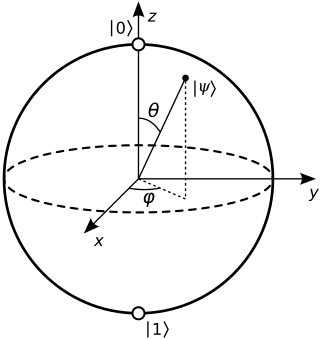
A quantum computer is a computer that exploits quantum mechanical phenomena. On small scales, physical matter exhibits properties of both particles and waves, and quantum computing leverages this behavior using specialized hardware. Classical physics cannot explain the operation of these quantum devices, and a scalable quantum computer could perform some calculations exponentially faster than any modern "classical" computer. Theoretically a large-scale quantum computer could break some widely used encryption schemes and aid physicists in performing physical simulations; however, the current state of the art is largely experimental and impractical, with several obstacles to useful applications.

This is a timeline of quantum computing.
Lov Kumar Grover is an Indian-American computer scientist. He is the originator of the Grover database search algorithm used in quantum computing. Grover's 1996 algorithm won renown as the second major algorithm proposed for quantum computing, and in 2017 was finally implemented in a scalable physical quantum system. Grover's algorithm has been the subject of numerous popular science articles.
Quantum information science is a field that combines the principles of quantum mechanics with information theory to study the processing, analysis, and transmission of information. It covers both theoretical and experimental aspects of quantum physics, including the limits of what can be achieved with quantum information. The term quantum information theory is sometimes used, but it does not include experimental research and can be confused with a subfield of quantum information science that deals with the processing of quantum information.
Samuel Leon Braunstein is a professor at the University of York, England. He is a member of a research group in non-standard computation and has a particular interest in quantum information, quantum computation, and black hole thermodynamics.
Quantum networks form an important element of quantum computing and quantum communication systems. Quantum networks facilitate the transmission of information in the form of quantum bits, also called qubits, between physically separated quantum processors. A quantum processor is a machine able to perform quantum circuits on a certain number of qubits. Quantum networks work in a similar way to classical networks. The main difference is that quantum networking, like quantum computing, is better at solving certain problems, such as modeling quantum systems.
The Research School of Physics (RSPhys) was established with the creation of the Australian National University (ANU) in 1947. Located at the ANU's main campus in Canberra, the school is one of the four founding research schools in the ANU's Institute of Advanced Studies.
Daniel Amihud Lidar is the holder of the Viterbi Professorship of Engineering at the University of Southern California, where he is a professor of electrical engineering, chemistry, physics & astronomy. He is the director and co-founder of the USC Center for Quantum Information Science & Technology (CQIST), the director of the USC-IBM Quantum Innovation Center, as well as scientific director of the USC-Lockheed Martin Quantum Computing Center, notable for his research on control of quantum systems and quantum information processing.

The National Computational Infrastructure is a high-performance computing and data services facility, located at the Australian National University (ANU) in Canberra, Australian Capital Territory. The NCI is supported by the Australian Government's National Collaborative Research Infrastructure Strategy (NCRIS), with operational funding provided through a formal collaboration incorporating CSIRO, the Bureau of Meteorology, the Australian National University, Geoscience Australia, the Australian Research Council, and a number of research-intensive universities and medical research institutes.

Genevieve Bell is the Vice-Chancellor of the Australian National University and an Australian cultural anthropologist. She is best known for her work at the intersection of cultural practice research and technological development, and for being an industry pioneer of the user experience field. Bell was the inaugural director of the Autonomy, Agency and Assurance Innovation Institute (3Ai), which was co-founded by the Australian National University (ANU) and CSIRO’s Data61, and a Distinguished Professor of the ANU College of Engineering, Computing and Cybernetics. From 2021 to December 2023, she was the inaugural Director of the new ANU School of Cybernetics. She also holds the university's Florence Violet McKenzie Chair, and is the first SRI International Engelbart Distinguished Fellow. She is widely published, and holds 13 patents.
Thomas Worthington is an Australian computer programmer best known as an expert witness in the Maguire v SOCOG 2000 Olympic web accessibility case and teacher of Green computing.
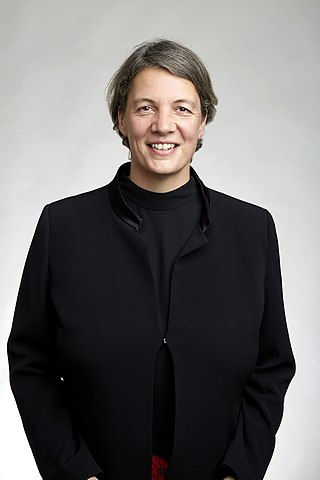
Michelle Yvonne Simmons is an Australian quantum physicist, recognised for her foundational contributions to the field of atomic electronics.
Ping Koy Lam is an Australian scientist and Professor of Physics at the Australian National University in Canberra. He is currently an Australian Research Council Australian Laureate Fellow and a work package director and program manager in the ARC Centre for Quantum Computer and Communication Technology. For his PhD thesis in 1999 he was awarded the Australian Institute of Physics Bragg Medal. He was awarded the 2003 British Council Eureka Prize for inspiring science and the 2006 UNSW Eureka Prize for innovative research.
Chennupati Jagadish, an Indian-Australian physicist and academic, is the President of the Australian Academy of Science, and a Distinguished Professor of Physics at the Australian National University Research School of Physics. He is head of the Semiconductor Optoelectronics and Nanotechnology Group which he established in 1990. He is also the Convener of the Australian Nanotechnology Network and Director of Australian National Fabrication Facility ACT Node.

Elham Kashefi is a Professor of Computer Science and Personal Chair in quantum computing at the School of Informatics at the University of Edinburgh, and a Centre national de la recherche scientifique (CNRS) researcher at the Sorbonne University. She is known as one of the inventors of blind quantum computing. Her work has included contributions to quantum cryptography, verification of quantum computing, and cloud quantum computing.

Andrea Morello is the Scientia Professor of Quantum Engineering in the School of Electrical Engineering and Telecommunications at the University of New South Wales, and a Program Manager at the ARC Centre of Excellence for Quantum Computation and Communication Technology (CQC2T). Morello is the head of the Fundamental Quantum Technologies Laboratory at UNSW.
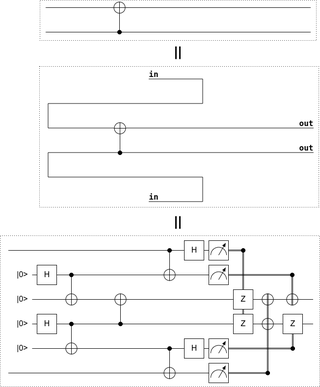
Quantum gate teleportation is a quantum circuit construction where a gate is applied to target qubits by first applying the gate to an entangled state and then teleporting the target qubits through that entangled state.
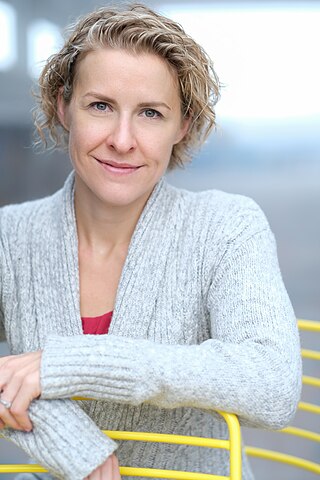
Stephanie Simmons is the co-chair of the Advisory Council on Canada's National Quantum Strategy and a Canadian Research Chair in Quantum Computing at Simon Fraser University. She is also the founder and Chief Quantum Officer at Photonic Inc., a spin out company which focusses on the commercial development of silicon photonics spin qubits. She was named by Caldwell Partners as one of Canada's Top 40 Under 40 in 2020. Her research considers the development of silicon-based systems for quantum computing.
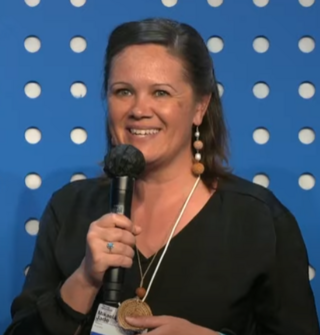
Mikaela Jade is an Australian entrepreneur, and founder and CEO of Indigital, a business that aims to help embed Indigenous stories and history into the mainstream, by using augmented reality technology. She has won multiple international awards, including the Veuve Clicquot New Generation award for digital technology 2018, as well as the Schwab Foundation's Social Innovators of the Year, 2022, and Indigenous Leader of the Year, 2021. Jade has also been nominated for ACT Australian of the Year 2023 and was awarded the ANU Indigenous Alumna of the Year.












